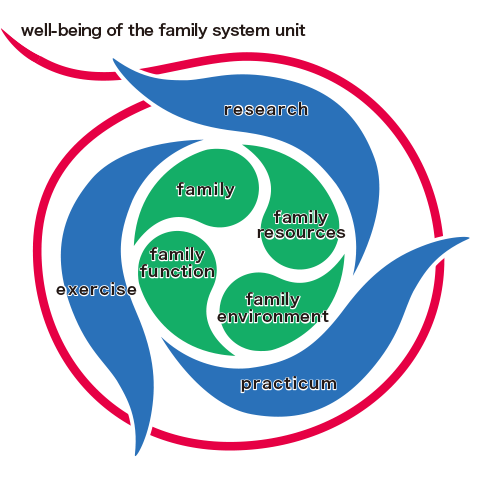Undergraduate Curriculum:
A total of 12 subjects are covered, including Child Health Care Nursing, Family Health Care Nursing, Practicum in Practical Nursing Interventions I (Pediatrics, Family), Nursing Pacticum Integration, Graduation Research and others.
Graduate School Curriculum:
A total of 20 subjects, including Family Health Care Nursing Theory, Family Intervention, Transcultural Family Health Care Nursing, Thesis Research of Family Health Care Nursing I, Advanced Clinical Practicum in Family Health Care Nursing and others.
Training Program for CNS in Family Health Nursing
The Certified Nurse Specialist (CNS) in Family Health Nursing Program has been structured so that core lectures aimed at understanding the family, family function, family environment and family resources can be organically combined with research, seminar and practicum. These are then positioned as family support aimed at realizing the well-being of the family system unit at all segments of their growth and development, with the ability to acquire the knowledge, techniques and research methods necessary for these as its key characteristic. Candidates completing this program are awarded a Master's degree in Nursing, and receive a diploma certifying them as having completed the program.
It should be noted that soon after admission to the program candidates undergo early exposure, with the objective of training and motivation to form the image of CNS in Family Health Nursing, and engage in shadowing training that emulates the CNS in Family Health Nursing. Also, exercises and case studies aimed at participant families are considered, and through on-the-job practicum under a working CNS in Family Health Nursing, this has the objective of providing them not only with "practice," but enabling them to take on all the roles of a CNS in Family Health Nursing, including "consultations," "coordination," "ethical coordination," "education" and "research." In addition, for two years following admission to the program, family health care nursing research is taken up from the international perspective, with guidelines providing for submission of English-language papers to international journals. By this, we aim to nurture the CNS in Family Health Nursing who can conduct family support based on evidence and theory acquired through research, and specialist who can function at an international level.
At the Certified Nurse Specialist (CNS) in Family Health Nursing Program offered at Kobe University Graduate School of Health Sciences, the curiculum has changed from 26 to 38 units in academic year 2011. We nurture the CNS in Family Health Nursing that participates in diagnosis, treatment and therapy, and fuses care and cure at a high level of practice. This program is offered only at Kobe University Graduate School of Health Sciences (for details, please refer to the review article below).
Hohashi, N. & Nishimoto, Y. (2012). Specialized education in family health care nursing: The training of new CNS in Family Health Nursing who fuses care and cure. Health Care, 54(9), 586-591. [in Japanese]

Conceptual Diagram of Training Program for CNS in Family Health Nursing at Kobe University Graduate School of Health Sciences







